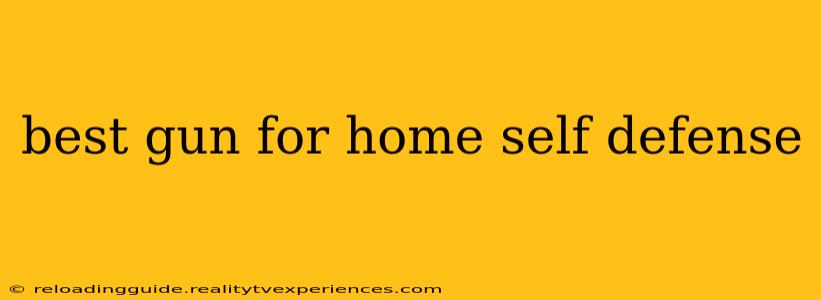Choosing the best gun for home self-defense is a deeply personal and responsible decision. It requires careful consideration of several factors, including your physical capabilities, experience level, living situation, and local laws. This guide aims to provide you with the information you need to make an informed choice, but always consult with a firearms expert and your local law enforcement before making a purchase.
Factors to Consider Before Choosing a Home Defense Gun
Before diving into specific firearm recommendations, let's examine the key factors influencing your decision:
1. Your Physical Capabilities and Experience
- Strength and Recoil Tolerance: Larger-caliber handguns (.40 S&W, .45 ACP) generate significant recoil. If you lack upper body strength or have limited shooting experience, a smaller caliber (9mm, .380 ACP) might be a better option. Consider renting and shooting different calibers to assess your comfort level.
- Shooting Experience: If you're a novice, opting for a firearm with a simple design and easy-to-learn operation is crucial. Consider taking a firearms safety and handling course before purchasing any weapon.
- Physical Limitations: Arthritis, reduced dexterity, or other physical limitations may influence your choice. Consider features like larger grips, reduced trigger pull weight (within safe parameters), and easy-to-manipulate controls.
2. Your Living Situation
- Space: If you live in a small apartment, a compact handgun might be more practical than a long gun.
- Noise Levels: Consider the potential noise disruption to neighbors, particularly in densely populated areas. Suppressors can mitigate noise, but their legality varies by location.
- Storage: Safe and secure storage is paramount. Invest in a high-quality gun safe and familiarize yourself with safe gun handling practices.
3. Local Laws and Regulations
- Licensing and Registration: Understand the laws governing firearm ownership, licensing, and registration in your jurisdiction. These regulations vary widely.
- Permitted Calibers and Weapon Types: Certain calibers or weapon types might be restricted in your area.
- Self-Defense Laws: Familiarize yourself with the "Stand Your Ground" and "Castle Doctrine" laws applicable in your state. These laws significantly impact your legal recourse if you use a firearm in self-defense.
Types of Firearms Suitable for Home Defense
Several firearm types are commonly used for home defense:
1. Handguns
- Pros: Easy to maneuver in tight spaces, relatively easy to conceal (for some models).
- Cons: Requires accurate shot placement due to lower capacity and shorter range. Higher recoil in larger calibers.
- Popular Choices: Glock 19 (9mm), Sig Sauer P320 (9mm), Springfield XD-S (9mm or .45 ACP), Smith & Wesson M&P Shield (9mm or .40 S&W).
2. Shotguns
- Pros: Effective at close range, intimidating visual deterrent, relatively easy to operate.
- Cons: More cumbersome to maneuver than handguns, recoil can be substantial.
- Popular Choices: Remington 870, Mossberg 500/590 (pump-action), Benelli M4 (semi-automatic). Consider a shorter-barreled shotgun for home defense.
3. Rifles
- Pros: Higher capacity magazines, greater effective range.
- Cons: Generally less maneuverable in close quarters than handguns or shotguns. Require more practice and skill to master.
- Popular Choices: AR-15 platform (in calibers like .223/5.56mm), other semi-automatic rifles chambered in suitable calibers.
Choosing the Right Caliber
Caliber selection impacts recoil, stopping power, and ammunition availability. Popular home defense calibers include:
- 9mm: A good balance of stopping power, manageable recoil, and ammunition availability.
- .40 S&W: More powerful than 9mm, but with greater recoil.
- .45 ACP: Significant stopping power, but with substantial recoil.
- .380 ACP: A smaller, less powerful caliber suitable for those with reduced strength or recoil sensitivity.
- 12 Gauge (Shotgun): Highly effective at close range.
Beyond the Firearm: Essential Considerations
- Ammunition Selection: Choose high-quality self-defense ammunition designed for penetration and expansion. Consult with a firearms expert for recommendations.
- Training: Professional firearms training is absolutely crucial. Learn proper gun handling, marksmanship, and the legal implications of using a firearm in self-defense.
- Situational Awareness: Home security measures, such as alarm systems and exterior lighting, can improve safety.
- Legal Counsel: Consult with a lawyer specializing in self-defense law to understand your rights and responsibilities.
This guide provides a starting point for your research. The best gun for home self-defense is the one you can comfortably handle, accurately operate, and are proficient in using. Remember, responsible gun ownership includes rigorous training, safe storage, and a deep understanding of applicable laws. Prioritize safety and seek professional guidance throughout this process.

